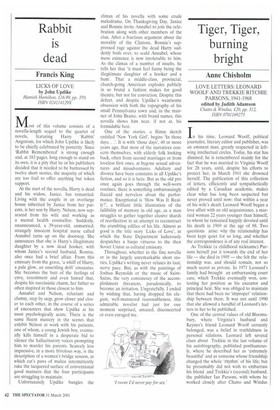Rabbit is dead
Francis King
LICKS OF LOVE by John Updike Hamish Hamilton, £16.99, pp. 359, ISBN 024114129X Most of this volume consists of a novella-length sequel to the quartet of novels, featuring Harry 'Rabbit' Angstrom, for which John Updike is likely to be chiefly celebrated by posterity. Since 'Rabbit Remembered' is strong enough and, at 183 pages, long enough to stand on its own, it is a pity that he or his publishers decided that it needed to be buttressed by twelve short stories, the majority of which are too frail to offer anything but token support.
At the start of the novella, Harry is dead and his widow, Janice, has remarried. Living with the couple in an overlarge house inherited by Janice from her parents, is her son by Harry, Nelson, now separated from his wife and working as a mental health counsellor. Suddenly, unannounced, a 39-year-old, unmarried, strangely innocent hospital nurse called Annabel turns up on the doorstep. She announces that she is Harry's illegitimate daughter by a now dead hooker, with whom Janice's second husband, Ronnie, also once had a brief affair. From this emissary from the grave, 'a whiff of Harry, a pale glow, an unsettling drift' emanates. She becomes the butt of the feelings of envy, resentment and even hatred that, despite his narcissistic charm, her father so often inspired in those closest to him.
Annabel and Nelson, reluctant and clumsy, step by step, grow closer and closer to each other, in the course of a series of encounters that show Updike at his most psychologically acute. There is the same fluent mastery in the scenes that exhibit Nelson at work with his patients, one of whom, a young Jewish boy, eventually kills himself in a desperate bid to silence the hallucinatory voices prompting him to murder his parents. Scarcely less impressive, in a more frivolous way, is the description of a women's bridge session, at which cat's paws of malice intermittently rake the lacquered surface of conventional good manners that the four participants are struggling to maintain.
Unfortunately Updike bungles the climax of his novella with some crude melodrama. On Thanksgiving Day, Janice and Ronnie invite Annabel to join the celebration along with other members of the clan. After a fractious argument about the morality of the Clintons, Ronnie's suppressed rage against the dead Harry suddenly boils over, to scald Annabel, whose mere existence is now intolerable to him. As the climax of a number of insults, he tells her that 'it must feel funny being the illegitimate daughter of a hooker and a bum'. That a middle-class, provincial, church-going American explodes publicly in so brutal a fashion makes for good theatre, but not for conviction. Despite this defect, and despite Updike's wearisome obsession with both the topography of his small Pennsylvania town and, in the manner of John Braine, with brand names, this novella shows him near, if not at, his formidable best.
One of the stories, a flimsy sketch entitled 'New York Girl', begins 'In those days. . .'. It is with 'those days', 40 or more years ago, that most of the narratives concern themselves, with elderly folk looking back, often from second marriages or from loveless first ones, at bygone sexual adventures and misadventures. Adultery and divorce have been constants in all Updike's fiction, and so it is here. But as the old pro once again goes through the well-worn routines, there is something embarrassingly flaccid and nerveless about the performance. Exceptional is 'How Was It Really?', a brilliant little illustration of the fallibility of memory in old age, as a man struggles to gather together elusive shards of recollection in an attempt to reconstruct the crumbling edifice of his life. Almost as good is the title story `Licks of Love', in which the State Department ludicrously despatches a banjo virtuoso to the then Soviet Union as cultural emissary.
Throughout, whether in the fine novella or in the largely unremarkable short stories, Updike's writing never relaxes its taut, nervy pace. But, as with the paintings of Joshua Reynolds or the music of SaintSaens, the very consistency of the accomplishment threatens, paradoxically, to become an irritation. Ungratefully, I ended by wishing that, having dropped his elegant, well-mannered reasonableness, this admirable novelist had just for one moment surprised, amazed, disconcerted or even enraged me.


























































































 Previous page
Previous page